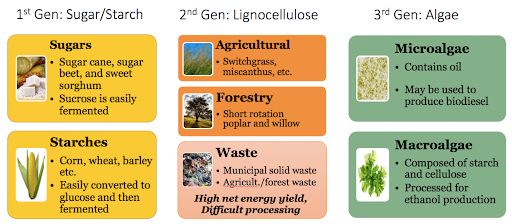4th Generation Biofuels

Biofuels can be groups into 4 categories based on the characteristics of their source Biomass, their performances as renewable sources of energy and the technologies they utilise. 1st Generation Biofuels are produced from Biomass resources that may also be food sources such as oil or Sugar Crops. 2nd Generation Biofuels are produced from non-food Biomass resources such as woody Biomass materials. 3rd Generation Biofuels are produced from alternative Biomass resources such as Algae. 4th Generation Biofuels are produced from Biomass resources where the aim is not only to produce sustainable energy, but also provide a mechanism of capturing and storing CO2.
4th Generation Biofuels are produced from sustainable produced Biomass resources with strong CO2 absorption attributed through their growth. These resources are converted into biofuels using the same processes as 2nd Generation Biofuels, although at all stages of production the CO2 is captured wherever practical. The CO2 can then be sequestered by storing it in geological formations such as old oil and gas fields or saline aquifers. This carbon capture makes 4th Generation Biofuel production carbon negative rather then simply carbon neutral, as it is ‘locks’ away more carbon than it produces.
People who contributed to this article:
Dr. Andrew Welfle